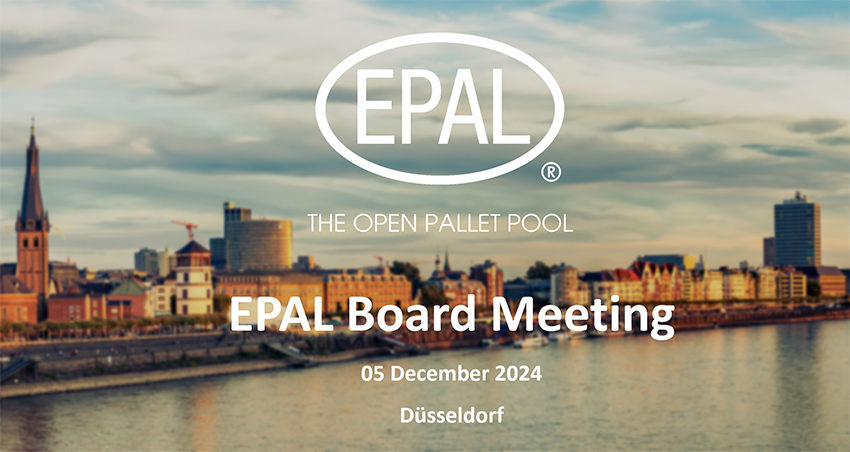EPAL Board meeting on 05 December 2024 in Düsseldorf
EPAL Board meeting on 05 December 2024 in Düsseldorf
The EPAL Board met on 05 December 2024 for its fourth and final meeting in 2024, which traditionally takes place at EPAL's headquarters in Düsseldorf. In addition to an initial review of 2024, the Board also discussed important projects planned for 2025 together with the 2025 budget. The focus of the planning is on continuing the digitalization of the EPAL pallet pool.
The introduction of the EPAL Euro pallet QR in January 2024 was a success. The target of producing one million EPAL Euro pallets with a QR code on the right-hand corner blocks, which was originally planned for the year as a whole, was already achieved in September. For 2024, the Management Board expects the production of around 1.4 million EPAL Euro pallets QR, and this figure should be significantly exceeded in 2025. EPAL will therefore promote and support the conversion of the production of EPAL Euro pallets to marking with individual QR codes even more intensively than has already been the case to date.
Roman Malicki, Member of the EPAL Board and President of EPAL Polska:
„We want EPAL Euro pallets with QR codes to be available easily and in large numbers in all European countries by the end of 2025. It is therefore our goal that in the coming years, step by step, all EPAL-licensed manufacturers of EPAL Euro pallets will be able to produce EPAL Euro pallets with a QR code. I myself recently completed the conversion to the production of EPAL Euro pallets QR in my company and can now offer my customers the option of using the QR code for their digital logistics processes. The uniqueness of each individual QR code supports the track and trace of pallets and goods, both in transport logistics and intralogistics.“
The success of the EPAL Euro Pallet QR has further positive consequences: the EPAL Board of Directors has decided that QR code marking should also be prepared for all other EPAL pallets and that it should go into series production in the course of 2025. The focus is in particular on the EPAL 3 pallet and the EPAL CP pallets.
The EPAL 3 pallet (1,000 x 1,200 mm) is becoming increasingly popular and is used wherever a larger loading area is required for the transportation and storage of goods. With a QR code on the right-hand corner blocks, the variable application possibilities of the EPAL 3 pallet are further improved.
The same applies to EPAL CP pallets, which are becoming increasingly important as a reusable alternative to conventional CP pallets. In the chemical and pharmaceutical industries, the traceability of goods and pallets is of particular importance. This is optimally supported by the individual QR code on each individual EPAL CP pallet.
Dirk Hoferer, President of EPAL:
„For many years, I have been hearing from representatives of the chemical industry the desire for a high-quality CP pallet that can convey information about origin and use, thus enabling reuse even in sensitive supply chains. With the EPAL CP pallet QR, we will fulfil this wish and at the same time prepare CP pallet logistics for the requirements of the Packaging and packaging waste regulation (PPWR). The PPWR requires not only standardized and quality-assured CP pallets, but also the sharing of a wide range of information about material, reuse and recycling. The QR code on the new EPAL CP pallets QR will make all this possible.“
Another important part of EPAL's digitalization offensive is the digitalization of quality assurance. With around 25,000 unannounced and independent inspections carried out every year, EPAL has a special position among all pallet pools. No other pallet pool offers such an intensity of quality assurance, and users of EPAL pallets appreciate the associated guarantee of high quality of new and repaired EPAL pallets. In order to ensure this in the future, the EPAL Board has decided to invest in the digitalization of the inspections and their evaluation.
Bernd Doerre, CEO of EPAL:
„Every working day, EPAL's inspection companies carry out around 100 inspections at the premises of the licensees and also at the premises of users of EPAL pallets. We want to make these inspections even more effective and evaluate the inspection results even better. In the future, the use of artificial intelligence will also enable an immediate evaluation of the test results. If production errors are detected, it is important to react quickly. We will achieve this even better with the digitalization of inspections. By evaluating all inspection data, we also want to improve prevention and avoid production errors before they lead to quality defects.“
The first EPAL Board meeting in 2025 will take place on 20 March 2025 in Edinburgh. Prior to this, the Board will meet for a further strategy workshop on 27/28 February 2025.

